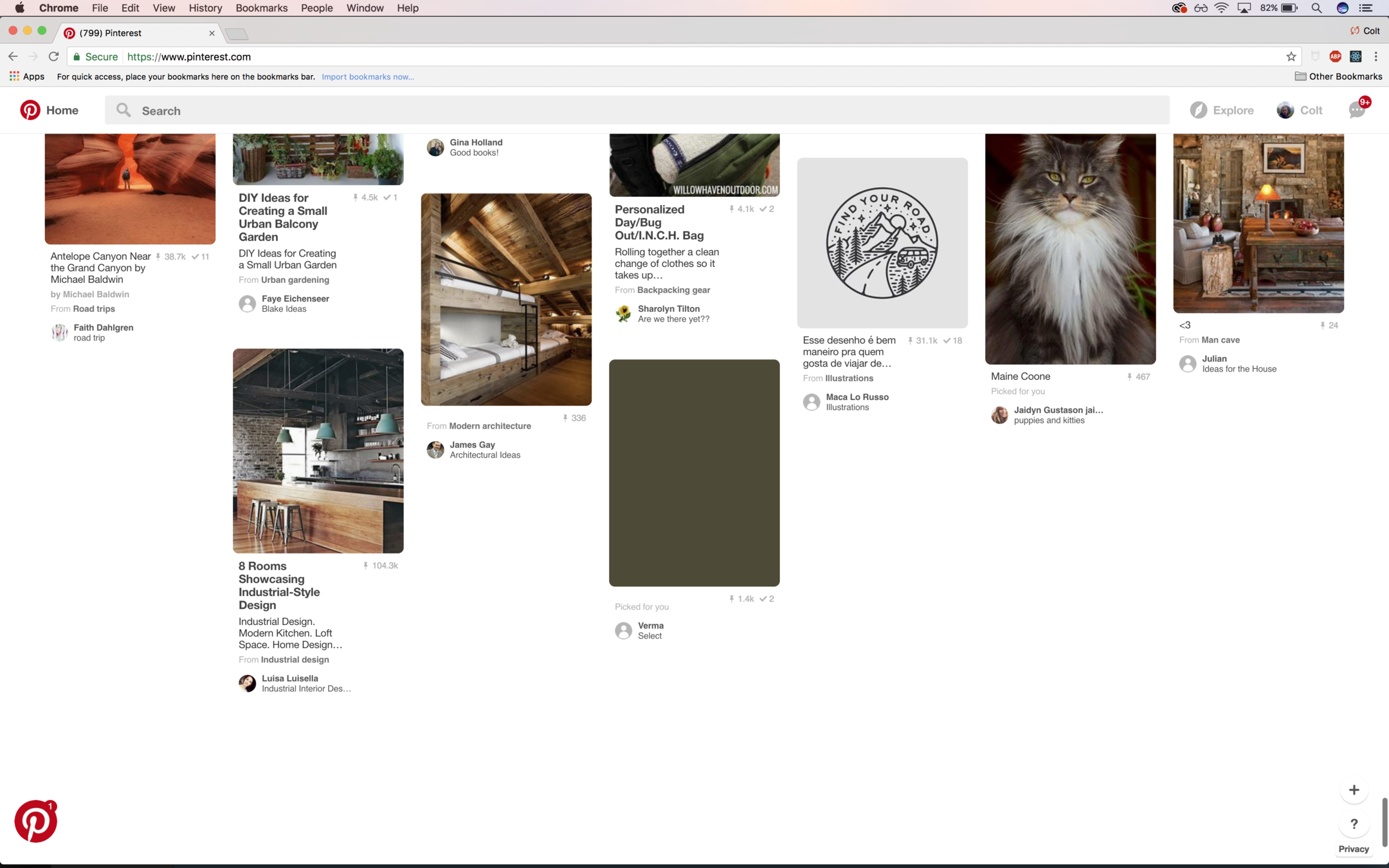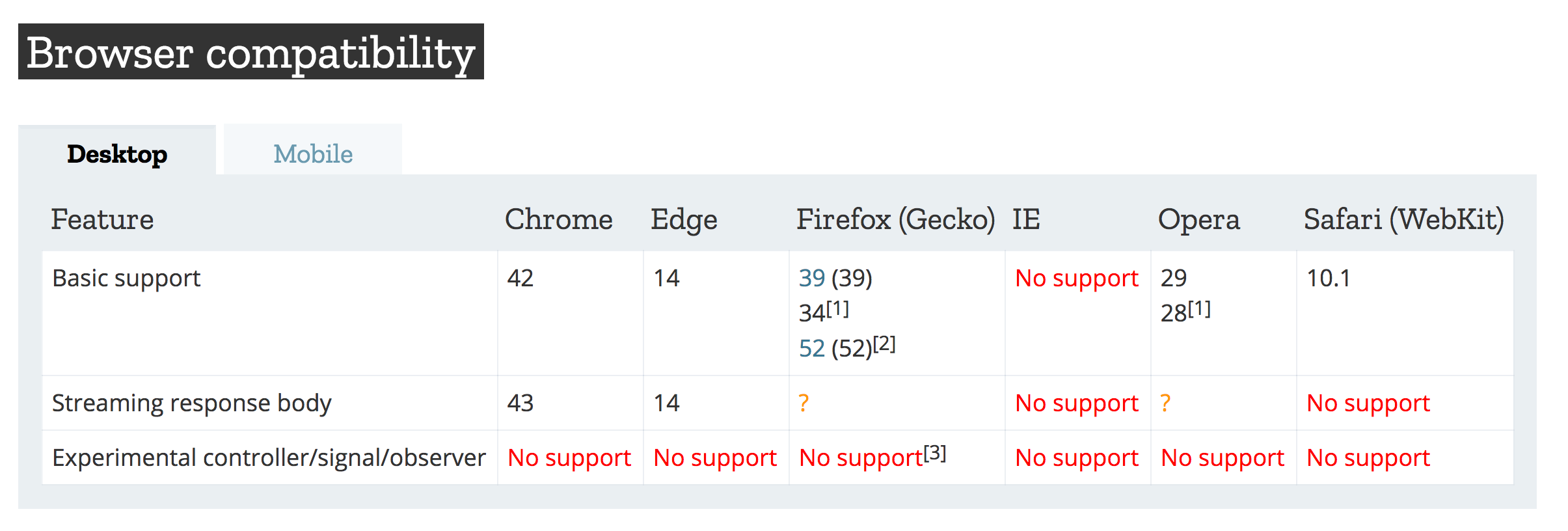AJAX
Asynchronous
JavaScript
and
XML
Not a great name...
AJAX IS NOT...
- A Library
- A Framework
- A Technology
AJAX IS...
an approach
(that's it)
JavaScript
HTML
The DOM
CSS
BACK IN 2005ish
"Hey wait a minute, all the pieces are here for us to make web apps that can update without refreshing!"
XMLHTTP Requests
What it boils down to
With AJAX, websites can send and request data from a server in the background without disturbing the current page
Today's Single Page Apps
How does Pinterest keep loading new content forever?!
AJAX!
Compare that with Reddit...
AJAX!
NOT

JavaScript
Server

"The user scrolled to the bottom!"
"Quick, send a request to the server and get more content!"
yeah, yeah here you go
"Now I'll just append the new data to the bottom of the page"
JavaScript
Server

"The user scrolled to the bottom!"
"Quick, send a request to the server and get more content!"
yeah, yeah here you go
"Now I'll just append the new data to the bottom of the page"
What This Section Is Really About
Making Requests with JavaScript
- XMLHTTP Request
- The Fetch API
- 3rd Party Libraries: jQuery, Axios, etc.
Asynchronous
JavaScript
and
XML
What's The Deal With This?
XML AND
JSON
Data formats
"Quick, send a request to the server and get more content!"
Server

WHAT DOES THE DATA LOOK LIKE?
API's don't respond with HTML. API's respond with pure data, not structure.
They use more efficient data formats like XML and JSON
Data Formats
XML
<pin>
<title>Adorable Maine Coon</title>
<author>Cindy S</author>
<num-saves>1800</num-saves>
</pin>Extended Markup Language
XML is syntacticly similar to HTML, but it does not describe presentation like HTML does
JSON
'pin': {
'title': 'Adorable Maine Coon',
'author': 'Cindy S',
'num-saves': 1800
}
JavaScript Object Notation
JSON looks (almost) exactly like JavaScript objects
JSON is more commonly used these days because it works so well with JavaScript
JavaScript Object Notation
It's in the name!
Asynchronous
JavaScript
and
JSON
Doesn't quite have the same ring to it
Making Requests with JavaScript
- XMLHTTP Request
- Fetch API
- 3rd Party Libraries: jQuery & Axios
XMLHTTP Requests
Quite A Mouthful
var XHR = new XMLHttpRequest();
XHR.onreadystatechange = function() {
if (XHR.readyState == 4 && XHR.status == 200) {
console.log(XHR.responseText);
}
};
XHR.open("GET", "https://api.github.com/zen");
XHR.send();Our First AJAX "App"
WHAT ABOUT POST REQUESTS??
var XHR = new XMLHttpRequest();
XHR.onreadystatechange = function() {
if (XHR.readyState == 4 && XHR.status == 200) {
console.log("it worked!");
}
};
var url = "www.blah.com";
XHR.open("POST", url);
XHR.send("some data");
XMLHTTP Post Requests
Typically Form Data
YOUR
TURN

Live Bitcoin Price Exercise
PROBLEMS WITH XHR
- Ugly, Bulky Syntax
- It's 16 Years Old
- No Streaming
ENTER THE FETCH API
fetch(url)
.then(function(res) {
console.log(res);
})
.catch(function(error) {
console.log(error);
});This Is How You Make Fetch Happen
Look at that clean syntax!
fetch(url).then(function(res) {
return res.json();
}).then(function(data) {
console.log(data);
}).catch(function() {
console.log("problem!");
});Parsing JSON with Fetch
Fetch Options
fetch(url, {
method: 'POST',
body: JSON.stringify({
name: 'blue',
login: 'bluecat',
})
})
.then(function (data) {
//do something
})
.catch(function (error) {
//handle error
});fetch(url)
.then(function(res) {
if (!res.ok) {
throw Error(404); //up to you
}
return res;
}).then(function(response) {
console.log("ok");
}).catch(function(error) {
console.log(error);
});Handling Fetch Errors
YOUR
TURN

fetch(url)
.then(handleErrors)
.then(parseJSON)
.then(updateProfile)
.catch(printError)Refactoring Fetch
FETCH IS COOL!
THE ONLY PROBLEM?

😭
AJAX With jQuery
jQuery
"The Write Less, Do More JavaScript Library"
function fadeIn(el) {
el.style.opacity = 0;
var last = +new Date();
var tick = function() {
el.style.opacity = +el.style.opacity
+ (new Date() - last) / 400;
last = +new Date();
if (+el.style.opacity < 1) {
(window.requestAnimationFrame &&
requestAnimationFrame(tick))
|| setTimeout(tick, 16);
}
};
tick();
}
fadeIn(el);$(el).fadeIn();Without jQuery
With jQuery
The Same Applies For Making Requests!
Making A Request And Parsing JSON
var request = new XMLHttpRequest();
request.open('GET', '/my/url');
request.onload = function() {
if (request.status >= 200 && request.status < 400) {
// Success!
var data = JSON.parse(request.responseText);
} else {
//do something
}
};
request.onerror = function() {
// There was a connection error
};
request.send();$.getJSON('/my/url', function(data) {
});Without jQuery
With jQuery
WAYYY
EASIER!
- $.ajax
- $.get
- $.post
- $.getJSON
jQuery AJAX Methods
Shorthand
Methods
$.ajax({
method: "GET",
url: "some.api.com",
})
.done(function(res) {
console.log(res);
})
.fail(function(){
//do something
})$.ajax
The "base" jQuery Method
just creates an XMLHttpRequest under the hood
What about parsing JSON?
Shorthand Methods
YOUR
TURN
IT'S TIME FOR RANDOM CAT PHOTOS
AXIOS
A lightweight HTTP request library
axios.get(url)
.then(function(res){
console.log(res.data);
})
.catch(function(e){
console.log(e);
})
axios.get
Makes a get request!
just creates an XMLHttpRequest under the hood
Handling Errors
With Axios
if (err.response) {
console.log("Problem With Response");
} else if (err.request) {
console.log("Problem With Request!");
} else {
console.log('Error', err.message);
}Handling Errors
AJAX
By Colt Steele
AJAX
- 4,829



